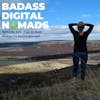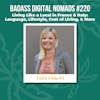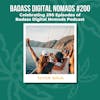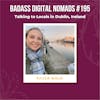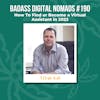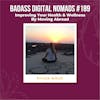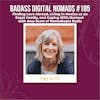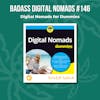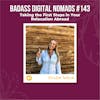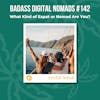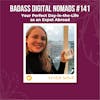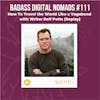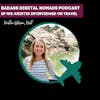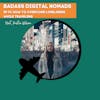The New E.U. Travel Ban Explained

June 30: The European Union confirmed today that it will be opening external borders of the continent. But who will be allowed in? Which nations will be banned? What are the criteria for determining which countries will be restricted from traveling to Europe and for how long? Find out today on Badass Digital Nomads.
June 30: The European Union confirmed today that it will be opening external borders of the continent. But who will be allowed in? Which nations will be banned? What are the criteria for determining which countries will be restricted from traveling to Europe and for how long? Find out today on Badass Digital Nomads.
SHOW NOTES & RESOURCES:
- *New* Badass Digital Nomads Merch! Available now on Teespring.com
- Medium.com: "The E.U. Travel Ban Explained"
- European Council June 30 Resolution and Countries List
........................................................................................................
Support the Badass Digital Nomads Podcast:
- Become a Patron
- Review on Apple Podcasts
- Leave a voice message
- Submit a question or recommend a guest (feedback survey)
Connect With Kristin on Socials:
-
- Follow on Instagram
- Subscribe to Digital Nomad TV on YouTube
- Subscribe to Traveling with Kristin on YouTube
- Join the Badass Digital Nomads Facebook Group
Sneak Peek:
Kristin: 00:00:00 Humans are resilient, and we're very resourceful, and we're very inventive and creative, and we will find a way to get through this and hopefully travel will be more accessible and sustainable, uh, for people on the other side of the pandemic.
Introduction: Welcome to Badass Digital Nomads, where we're pushing the boundaries of remote work and travel, all while staying grounded with a little bit of old school philosophy, self-development, and business advice from our guests.
Kristin: 00:00:43 Hi everybody. Welcome back to another episode of Badass Digital Nomads. I'm your host Kristin Wilson from Traveling with Kristin. And today we're going to talk about the impending Europe travel ban and what that means for people from all over the world, really, because on June 23rd, the New York Times published a report about the European Union and some additional countries which are going to be officially restricting incoming travel from a list of countries as of July 1st. And so none of this came as a surprise because on June 11th, Europe announced their reopening recommendations. And then as many of you know, on June 15th, the continent began reopening its borders, reopening its economy. I did quite a few videos about a reopening for tourism, and so it was pretty apparent that the block would need to restrict the same countries, like every country within the European Union would need to restrict incoming travel from the same countries in order to prevent another spike in COVID cases.
Kristin: 00:02:13 So in this podcast, I'm gonna just review what this travel ban consists of and what it means for the future of travel, because I think it's going to set a precedent for other countries and regions to follow. But of course, things are changing every day. So even today, right before I started, um, recording this, I saw information that coronavirus cases have increased since the June 15th reopening in Europe, and they have spiked and not spiked, but they have been increasing in 30 countries in Europe over the past two weeks. And that was from the World Health Organization. So everything that I'm talking about now might change again a month from now. Who knows? But if Europe can continue to suppress cases and countries like New Zealand are able to eradicate the coronavirus, then this is what I foresee happening. It affects international business and it affects what you'll be able to do as far as being location independent, where you'll be able to go and where you'll be able to live and work.
Kristin: 00:03:31 And that's, you know, what this podcast is all about. So before we get into some of the details on that, I just wanted to do a few announcements. And right now I'm wearing a sample of my new merch. We have merch now, people, merch, swag, whatever you wanna call it at, uh, teespring.com/TravelingwithKristin. I have my first two clothing and mug and beach towel <laugh> designs, beach towels for summer. Um, we have official badass digital nomads, t-shirts, um, tank tops, mugs, towels, lots of cool stuff available on teespring.com/TravelingwithKristin. We even have badass Digital Nomad socks, which are super fun. And I also have another design called Slow Travel, which I really love, and I've been trying to get these designs made for almost the past year. I haven't been able to find a designer that I liked. I went through like four or five people and I finally got the designs that I like.
Kristin: 00:04:41 So the shirt I'm wearing now is slow travel, and it is a digital nomad holding a laptop with a turtle backpack, and he's slow traveling. And at the bottom it says slow travel. So <laugh> obviously we can't travel that fast right now anyway, but I am confident that travel will be back eventually. And as you know, I'm a huge fan of slow travel because I think it's a great way to get to know a country or a city destination. It's a good way to get work done and be productive and give your mind, body and spirit a chance to acclimate to a new place. And it's a great way to meet people and feel at home in a new country. So I highly recommend slow travel when you are traveling as a digital nomad or remote worker or living abroad as an expat. Sometimes you might wanna go places really quickly and go to a new city every day or every week under different circumstances, and that's cool too.
Kristin: 00:05:49 But I think for long-term sustainability of a location independent lifestyle, it's a really good idea to pace yourself. And so that is the spirit and the essence of this T-shirt that I'm so excited about, and it's really super soft and comfy, and there's all different colors. I spent way too long <laugh> picking out which T-shirts and which colors I wanted to offer. Um, so yeah, a little bit obsessed with <laugh> with the store. But, um, I hope that you, uh, check it out and I hope that you love the ideas for this merch as much as I do. And definitely, uh, let your digital nomad flag fly and head over to the store at teespring.com/TravelingwithKristin. I'll link to it in the show notes and, um, support the podcast and look cool at the same time. So do it. Uh, KMA, what else? Oh, I wanted to thank everybody who has been leaving reviews over the past couple weeks.
Kristin: 00:06:54 I'll start highlighting them or keep highlighting them every week. And just yesterday or a couple days ago, I got one from Manoa who says, love this series. Love the content and info. And this is a review in the Apple Podcast store. And then a super, super nice review from SDweller who says, incredible. I've listened to many digital nomad podcasts. This is the best <laugh>. Kristin really is someone who gets things done. It is amazing to me how successful she really is at working independently. There are those that talk about getting things done and those that actually do it start to finish inspirational. Every time I listen to one of her podcasts or watch one of her YouTube videos, I am informed and learn, period. Isn't this why we spend our time on these things? Fantastic. Please keep it up. Kristin, thank you SDweller.
Kristin: 00:07:52 I definitely will. And it means so much to read that review from you because I'm a human being too <laugh>, and like somebody said in my mastermind this week, it's good to know that you are human, Kristin, because I was talking about how, you know, I still struggle with getting things done and motivation, and I was talking to my Patreon patrons because I share all of my videos and stuff early on Patreon, and I was telling one of them that I still have to get myself in a good mood every day. Um, I still have to kind of, yeah, you have to get yourself into the mood to work, and that can be really hard during tough times like these. But even though I think, you know, I can be hard on myself, and I do get a lot of stuff done in my head, I'm never getting as much done as I had planned.
Kristin: 00:08:52 And so sometimes that can be a struggle. Um, but I also feel like in a way, I'm making up for time that years went by, that I thought about doing things and didn't do them. So please learn from my experiences and mistakes and struggles. And of course, no regrets, right? Because whatever decision you made and whatever you did in life, that's the path that you're on, and you've gotta just start where you are and go from there. But, um, yeah, it's, it's helpful to hear that, that this content is helpful for you guys because I do spend a lot of time researching and trying to make it the best that it can be. And when I am trying to get motivated to work, I think about, you know, what is the outcome that I want from this? What do I want people to learn and what do I want people to gain from it?
Kristin: 00:09:48 And I just try to find that strength to like bring it, you know, <laugh>, bring the value and make this worth your time and make a difference. Thanks everybody. Without further ado, as I'm rambling along, let's get into the EU travel ban and what you can expect for post pandemic travel. And I don't even wanna call it post pandemic travel because this pandemic is far from over, unfortunately, but we'll call it during the pandemic travel. So as you guys know, Europe was one of the first regions in the world to start reopening back in mid-May and into mid-June. Um, but some European diplomats apparently leaked some documents from the European Commission to the New York Times in a report that was published a few days ago on June 23rd. And it basically discloses a, I'm gonna call it like the good list of countries that, um, its citizens will be allowed to travel to the EU for non-essential purposes.
Kristin: 00:11:01 And then there's basically the shit list. And these are countries that don't have their shit together when it comes to managing the coronavirus pandemic. And that list is longer than the prior list. So there's more countries in the world that are struggling with containing the pandemic versus that have it under control. So I guess that's to be expected. But in essence, the point of this ban, and this, these official restrictions on countries that are allowed in and that aren't allowed in is because the European Union, and especially the Schengen area, is vulnerable at any point of entry. So if everybody's not abiding by the same rules, then people could come in, you know, bring the virus in and then spread it all throughout Europe because there are no internal border checks, or, you know, there haven't been since the nineties, since the Schengen um, treaty was signed in the eighties, but since it was implemented and there have been a free flow of goods and people throughout, uh, Europe, or at least the 26 Schengen countries, I think there are.
Kristin: 00:12:22 But anyway, the EU 27 member states plus Norway, Switzerland, ice Iceland, uh, Lichtenstein, I'm saying that wrong for sure, will be restricting incoming travel from any country with a COVID-19 infection rate above the EU average. So again, the basic essence is that if Europe wants to contain and prevent or suppress any future outbreaks, then all of the member nations have to apply the same rules to incoming tourists. So, uh, what I think will happen is that if Europe implements this policy, and then if it's working, then other non-EU countries, maybe in Eastern Europe and the Balkans, and in other regions of the world in Asia where, um, infections are contained, they will implement similar measures where they are only allowing tourists from countries that have a very low infection rate. So just for perspective, the data that I have found, um, in the past few days says that the EU's infection rate is around six people per 100,000.
Kristin: 00:13:41 And the US is at 107 people per 100,000. Now, I don't know how long, uh, this restriction will be in place, but it says that they are going to reassess the banned countries and the allowed countries every two weeks after July 1st. So any countries that can reduce their infection rate will be allowed to travel to the European Union. But it does seem that since Europe started reopening on June 15th, cases are on the rise. So we could end up seeing a situation where Europe has to shut down again, um, because they have started letting people in for summer travel and, you know, cases just spike again. So which countries are going to be allowed in at first and which ones will be banned. So it's important to note that so far, this is hearsay and it hasn't been officially confirmed, but probably the next week after this podcast is published in the next couple days, we should hear an official statement from the EU.
Kristin: 00:14:58 Um, but basically according to the, the New York Times 42 countries are on the approved list, and I don't have the full list, but it includes Canada, Turkey, China, Uganda, Cuba, and Vietnam. And I'm sure maybe other countries like South Korea could be on that list. And then there's 54 countries on the shit list, <laugh>, for lack of a better word, including, uh, Russia, Brazil, Peru, Panama, Chile, Saudi Arabia, and the US and probably many more I'm expecting, um, probably Ecuador and, uh, just a lot of countries that haven't been able to, uh, contain the virus, keep the new rate of infection down, and also implement crisis management policies that are in line with EU standards. So contact tracing, testing, containment, treating and reporting. So the ban, when will it go into effect and how long will it last? It's going to start probably in July, and then it will last as long as Europe is able to keep its economy and borders open while keeping infection rates down.
Kristin: 00:16:21 And then we'll also see probably some more non-EU, but like regional travel bubbles or travel corridors. So we'll just have to see how long that the self-proclaimed covid free countries like Slovenia and Montenegro and Cyprus will be able to stay that way. Um, but the main point is that in Europe countries have been acting unilaterally in reopening their borders, and the European Commission is just very eager to apply uniform standards to how every country will operate. So, you know, people from 80 different countries listen to the podcast and probably half of us will be allowed to travel to Europe and half of us will not be able to. Um, about half of the listeners are in the US right now. So I'll just make a special note about US citizens, um, and what this means because the US is still a global economic power, and of course very important for tourism in Europe.
Kristin: 00:17:35 And with our large population. We have a lot of travelers here. So the New York Times wrote that prohibiting American travelers from entering the European Union would have significant economic, cultural and geopolitical ramifications. But I think in this case it's clear that that health is more important than money or politics or the economy. And we've basically had a travel ban anyway since Trump announced the Europe travel ban from the US perspective back on March 14th. So even though airlines have still been doing flights in between the US and Europe, it's been mostly for only essential travel and not for tourism. So, so what the New York Times is writing basically is that an extension of this Europe travel ban is going to have long-term consequences, especially between, um, you know, Europe and its allied nations like the US who haven't been able to contain their infection rates. But we have a, a very important crisis in the US right now because the US has 4% of the world's population and nearly, I think 30% of the covid deaths.
Kristin: 00:18:58 So it's not even that the US is struggling to contain the virus at this point. It's that the US government isn't trying to contain the virus, and that's the problem. And so that does prevent a really unfortunate situation for US citizens, myself included, because it doesn't seem like we're going to get our numbers under control anytime soon. And in the meantime, all of those numbers represent human beings who are, who are suffering and who are dying because of the coronavirus. So as of recording this episode, uh, the US has, uh, 2.4 million confirmed cases and the highest death toll in the world, over 123,000 people. And the infection rates in the US are at the highest level since April with, uh, no signs of slowing down. And I heard a statistic on BBC news this morning that Arizona has a higher per capita infection rate than any country in Europe.
Kristin: 00:20:12 The US also set a new record for infections on June 24th, surpassing the previous peak of 36,000 infections on April 25th. So as US states started reopening, the cases have been going up. Um, and as I mentioned, the federal government is not doing much to stop it. The Trump administration this week announced it's going to be reducing federal support for testing. And, um, even though Secretary of State, Mike Pompeo said that he's working to reopen global travel for Americans with Europe, I don't see that there's much that he can do because the White House and like the entire Trump administration is contradicting with, with their actions, any efforts that individuals in the administration might be making to reopen travel, um, it's just not going to work while the US has an infection rate 20 times higher than countries that US citizens want to travel to. So as long as the Trump administration ignores public health advice on an expert advice on how to contain the pandemic, Americans will be banned from traveling to Europe, I think, and not just Europe, but I think any country like Australia, New Zealand that have, um, been able to contain the virus, and of course this is all pending if those efforts continue working and they are able to keep their numbers down.
Kristin: 00:21:56 But for people from the US, Russia, Brazil, any of these countries on the band lists, I think that the only hope that we will have to be able to travel in in the near future would be to countries that are already open, like Mexico and places like Belarus and places in my, uh, 10 countries you can travel to now video, but also I think that we all may be able to travel to these places even in Europe if we self quarantine and possibly in a government facility. So I don't think that you will necessarily be quarantined in your country forever, you know, but I think in the foreseeable future, over the next few months, and certainly through the rest of the year, if you are from a country with a high infection rate, you might be restricted on where you can go or you probably will be.
Kristin: 00:22:59 And if you do wanna go anywhere for tourism plan to stay for at least a month or more, because you might have to be quarantined for two weeks when you get there. I also saw in the news this week that Canada and Costa Rica are expected to make similar announcements. So again, I I see more countries falling in line, uh, with Europe and kind of maybe half the world being able to travel for tourism to different safe countries and the other half kind of being isolated. So it's a bit strange, but that is the, uh, that is the situation right now. So just to summarize the situation, uh, Europe started reopening in May and June and has been able to keep their infection rate low, although cases have been rising over the past two weeks since the June 15th official reopening. And the European Union is expected to announce around July 1st a list of countries that will be restricted from traveling to the block and countries whose citizens will be allowed in for, uh, tourism and non-essential purposes.
Kristin: 00:24:14 That those lists will be revised every two weeks apparently, and countries can get added to one list or fall off of the other one that remains to be seen. And it also remains to be seen if this plan will work and if this measured reopening in Europe will allow the countries to keep their infection rates down. Um, so it's not great news, but you know, if there's one thing that we know about being human, it's that humans are very creative and inventive, and the world has been through pandemics before. So we will find a way out of this. It might not be the best situation for world travelers and digital nomads and, you know, people who just want to see the world. We might have a little bit of a pause still, but in the meantime, it's a good, it's a good time to explore your backyard, you know, to explore your home country and, and your area because travel's not going to be back in the way that it was before.
Kristin: 00:25:29 And that has its pros and that has its cons. The global travel industry was maybe getting a little bit out of control. It was a bit unsustainable before the pandemic happened. Emissions from air travel, I think made up about 4% of, of global emissions. So not the worst <laugh> culprit when it comes to the environment and things like that. But, you know, the way that we traveled before was built off of a foundation of global economic growth after the Industrial Revolution and after World War ii, it was kind of a heyday for travel. And this pandemic is forcing everything to slow down and, you know, forcing people to think, rethink, travel, um, especially after the tech boom as well. I just heard a video on YouTube, an interview with the, one of the co-founders of Airbnb, and he was saying that Airbnb has completely stopped all marketing.
Kristin: 00:26:37 They laid off a lot of workers, they cut more than a billion dollars in operating costs, but he said that demand for travel is increasing, uh, for domestic travel. So their domestic bookings are up despite not doing any marketing or advertising whatsoever. And so, even though this is not good news right now, that's very hard to find good news when it comes to, you know, the pandemic and the economic and the health implications of what's going on right now. But I'm, I think I'm a realist, but also an optimist. But to think about the bright side is that humans are resilient and we're very resourceful and we're very inventive and creative, and we will find a way to get through this and hopefully travel will be more accessible and sustainable, uh, for people on the other side of the pandemic. So it'll be interesting. I don't know exactly what things will look like later, but um, now is just a really good time to focus on, you know, putting your oxygen mask on first and then helping others.
Kristin: 00:27:58 So focus on yourself, focus on self-care, focus on your families, uh, focus on your business. Don't worry about when and if you'll be able to travel next. You know, just focus on what you can control now and think about it long-term because the world is a bit in a panic right now, and it might be in a panic for the next six months or for the next year. We don't know how long this is going to last, but it will, we will get through this. It will end eventually. And you wanna focus right now on what you can do to, you know, help yourself get through the day-to-day, but also how to set yourself up for more flexibility and more financial freedom when this is over. And it might not even ever be officially over, but when it's, you know, when we have a new normal to come back to.
Kristin: 00:28:59 So focus on finding a remote job or building your online business or creating a personal brand or monetizing your skills in some way, and try to distance yourself from a lot of the negativity and panic on the news and reflect on travel experiences you've had in the past. And take this time to think about, you know, what you would like your ideal life to be like in the future. You know, right now most of us are still on house arrest, but I know that I am personally really enjoying being able to go outside, go for a walk, go for bike rides. Um, my mom is coming to visit this weekend. So even though if, if we go out to eat with gloves and a mask on or whatever, you know, just being able to spend time with people you love, whether it's in person or remotely on FaceTime and not like wishing and hoping and praying for this to end.
Kristin: 00:30:05 Like of course we all, we all do, we want this suffering to end and, you know, we want the world to heal. But, you know, just take tiny steps, baby steps each day to getting yourself in a good mood, getting yourself into a positive frame of mind. Um, practice living life on your own terms now, uh, while you're at home. And think about places that you can visit nearby and think about adventures that you can go on in your home country. So there's a lot to explore out there. I've even been thinking of maybe going to Montana or going to Maine and kind of like going out into nature and getting a cabin or something. Who knows? Um, you know, there's still a lot of options and I've just been focusing on what I'm grateful for now, doing what I can do in my business and also creating content that has value and has an impact.
Kristin: 00:31:08 So even though there is some not so good news out there, um, there's still things that we can all do at home to cope with the situation and to build a better future, uh, for ourselves and others. And by living your best life and setting a good example, uh, for other people, I think that that's something very positive that you can do. So take care everybody, and thank you again to everyone who's been leaving reviews in the Apple Podcast store. I'm gonna be doing less interviews, I think over the next few weeks and months because current events are changing so much. And I just wanna be able to deliver timely news to you guys and provide resources that I think will help you cope with each thing that's happening right now. So this may be more content about travel updates, more content about how to make money online, and, you know, we'll just see what seems appropriate each week and each time.
Kristin: 00:32:17 And of course, if you have any recommendations, you can send me an email to hello@TravelingwithKristin.com or send me a private message on social media at Traveling with Kristin. And also click on the, uh, podcast feedback form in the show notes. It's just a Google form where you can leave feedback and leave, um, recommendations, questions, any guests that you want on the show or topics that you'd like me to cover. And you can also leave that in the form of a voice message on travelingwithKristin.com/podcast. We have a SpeakPipe, a little microphone there, you can leave an audio message. So thanks everyone. Stay safe. Talk to you soon.

Kristin Wilson
Host of Badass Digital Nomads & YouTube's Traveling with Kristin / Author of Digital Nomads for Dummies
Kristin Wilson is a long-term digital nomad and location-independent entrepreneur who has lived and worked across 60 countries in 20 years. Since founding a fully-remote, international relocation company in 2011, she has helped more than 1,000 people retire or live abroad in 35 countries. Today, she helps aspiring remote workers, digital nomads, and expats achieve their lifestyle goals through her YouTube channel (Traveling with Kristin) and podcast, Badass Digital Nomads.
Kristin is the author of Digital Nomads for Dummies. She's also a Top Writer on Medium and Quora in the topics of business, travel, technology, life, productivity, digital nomads, and location independence. She has been featured on The Today Show, Bloomberg Businessweek, Business Insider, ESPN, The New York Times, WSJ, Huffpost, HGTV’s House Hunters International, and more.



























